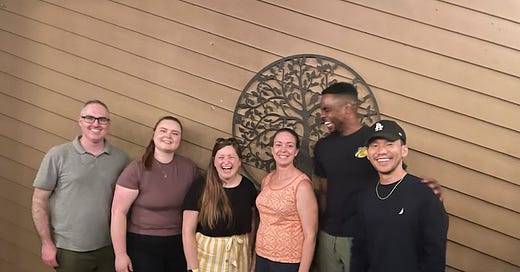To transition, or not to transition, that is NOT the question. Transitions are part of life, everyone’s life. We are all in the middle of a season change as summer turns to fall in the northern hemisphere. I’m learning that in middle age, where some seasons of life seem to last fairly long, it feels more jarring when something changes on you. As I’ve said before, life has to change in order to survive and keep living. The other option is decline, decay, and death. Since transitions are inevitable and necessary, the question then becomes how well do you handle transitions? What are your coping strategies? Are they life-giving strategies, or are they more avoidance? Do you have support in your transitions? Is it support that is helpful? Finally, do you accept transitions, or do you actively, whether subconsciously or not, resist them?
I’ve mentioned before (when talking about patterns in connection-making here) that it can be helpful to identify your major life transitions and see what themes emerge among them. The New York Times even published an article last week about how life reviews can be helpful, no matter your age. We who have served as chaplains (and other professions) know that life reviews can be helpful when persons are in crisis as well as when they are trying afterward to process the crisis. It can be empowering to say, “ok, here’s another situation that was kind of similar and I got through it. Therefore, I know I can get through this one, too.” Or the insight that comes when they realize which strategy helped them the most before; and they can try that strategy again now.
When you’re on the receiving end of a crisis, you’re generally not thinking rationally enough to brainstorm on your own about what helped you in the past that may help you now. Usually, we just want out of the predicament and to dull the pain. I’ve witnessed folks run out of the room and drive away. Others turn to alcohol and other numbing methods, like overeating, oversleeping, etc. Unfortunately, the only way out is through. A major life transition can feel especially difficult to navigate when it is one that you did not want, did not plan for, or did not expect. Taking a step back to review the big picture of your life can be beneficial and better empower you to take the step forward.
In addition, in reviewing, you can also readdress what lessons you gleaned from previous transitions. For example, in the post on patterns I referenced before, I mentioned that I learned to stay quiet and observe first. This skill has made me great at reading the room (I’ve been told by psychologists on formal evaluations that I’m “above average” at doing so). However, when others learn to expect me to stay quiet, not only is my voice not heard, sometimes it can be hard to overcome that expectation and make myself heard. Staying quiet, it turns out, has pros and cons, then and now. Fortunately, lately, I’ve been part of groups who encourage me to speak up, and want and value my contributions to the group, instead of groups I was in when I was younger who would just ignore me.
I hope that you are able to find groups who want and value your participation in the group. I hope that taking a step back and looking at your life as a whole is helpful for you to process whatever you’re experiencing now. You have overcome before; you can overcome again. If you need someone to talk this through with, please reach out to me. I’d be honored to listen.




